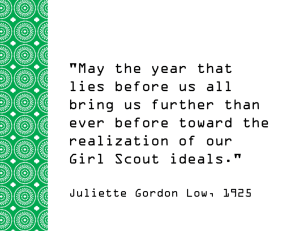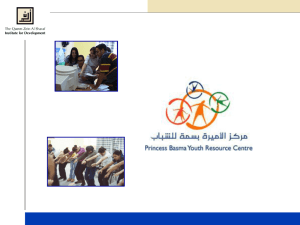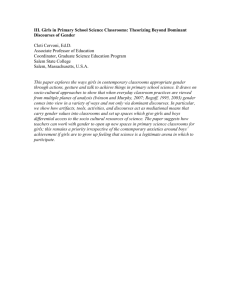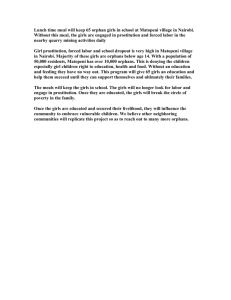lec 9 - York University
advertisement
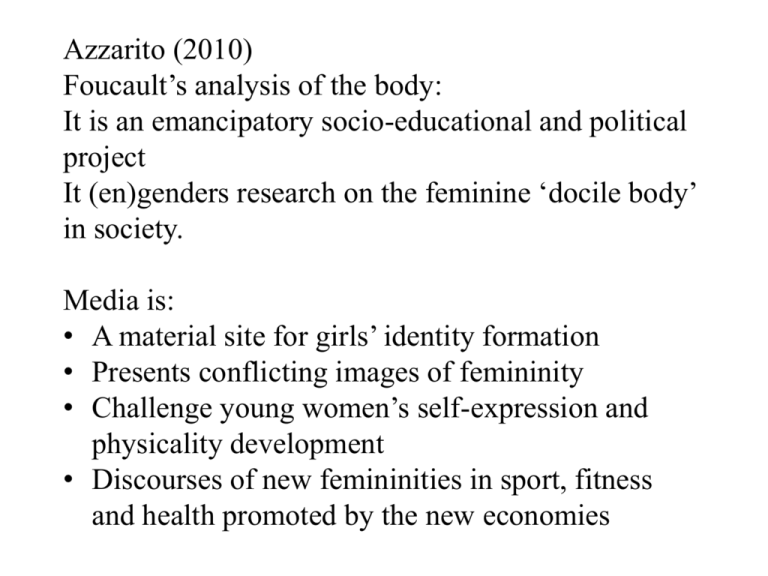
Azzarito (2010) Foucault’s analysis of the body: It is an emancipatory socio-educational and political project It (en)genders research on the feminine ‘docile body’ in society. Media is: • A material site for girls’ identity formation • Presents conflicting images of femininity • Challenge young women’s self-expression and physicality development • Discourses of new femininities in sport, fitness and health promoted by the new economies • Emerging contemporary monocultural discourses:‘Alpha Girl’ and the ‘Future Girl,’ • Powerful sporty, fit and healthy femininities • These discourses contradict the traditional feminine docile body https://www.youtube.com/watch?v=vdaHl4oWJHM 2.29 Alpha girl: How to spot an alpha girl ‘New pedagogies’ (i.e. media, magazines and website) Body as defined through these media : the feminine body is defined and circumscribed as a complement to and/or in opposition to the masculine body Popular culture constructs unrealistic ideals of women’s bodies Role of media in pedagogizing and celebrating slenderness, lack of muscularity and athleticism. Technologies of the self for achieving ‘perfection: Dieting and fitness practices promoted in health, fitness and fashion magazines These serve as technologies for achieving an unattainable, monodimensional notion of slenderness with its promise of ideal femininity The docile body in an ‘insane’ Western culture: • In extreme cases, the body becomes an anorexic or bulimic girl’s body • An obsessive body not only framed by but also culturally trapped The Alpha and the Future Girl • Emblems that represent new femininities • They are self-made, ambitious and independent girls • They have found sport and career paths as the most important areas of self-definition • They find these representations as socially successful bodies Western representations of non-Western girls are represented as antithetical and trivial in their positions compared to the white girls. In contrast, the Alpha and the Future Girls are marketed as universally available for all girls The reason is that these images are implicitly framed by whiteness as a notable difference. Such images of the white girls are sustained by globalization (Azzarito, 2009b), Media is replete with important sites of pedagogizing (invisible and visible pedagogies of identity) girls’ construction of their bodies The Muslim girl’s body remains portrayed not only as a covered body, a ‘silent body,’ but also as an oppressed and constrained female physicality • Often bodies are (mis)represented by the media • The media is a complex web of fantasies and realities that • inform their embodiment of the race/gender/class/religion • Schooling girls’ critical media awareness • • Critical media pedagogy enhances young people’s critical consciousness of virtuality and reality in the media. Schooling hybridity promotes multiple and fluid forms of girls’ bodies It celebrates ‘difference’ and the ‘possibilities to which heterogeneity gives rise’ It allows, engenders and legitimates girls’ hybrid narratives of the diverse ways they want to represent themselves They want to become diverse and represented so in the context of physical-activities.



